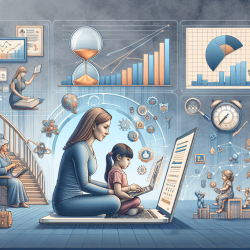The COVID-19 pandemic forced educators worldwide to make an abrupt transition to online teaching. For many STEM teachers, this shift was fraught with challenges but also presented unique opportunities for growth and development. A recent study titled "Transitioning to Online Teaching During the COVID-19 Pandemic: an Exploration of STEM Teachers’ Views, Successes, and Challenges" sheds light on these experiences and offers valuable insights for educators navigating similar transitions.
The Challenges of Online Teaching
The study reveals that despite some successes, many STEM teachers faced significant challenges during their transition to online teaching. These challenges included:
- Time Constraints: Teachers reported that the time required to adapt their teaching materials for online platforms was overwhelming. Many found themselves working long hours beyond the typical school day.
- Technological Barriers: A lack of access to high-speed internet and necessary equipment hindered both teachers' and students' ability to engage effectively in online learning.
- Student Engagement: Maintaining student engagement proved difficult, particularly when students felt isolated or unmotivated due to the lack of face-to-face interaction.
- Assessment Challenges: Teachers struggled with assessing student work authentically online, raising concerns about plagiarism and the integrity of assessments.
Successes Amidst the Struggles
Despite these hurdles, the study also highlights several successes experienced by STEM teachers during this period:
- Enhanced Technological Competence: Many teachers reported developing new digital skills and becoming more comfortable with online teaching tools.
- Increased Student Autonomy: Some students thrived in the online environment, showing increased independence and responsibility for their learning.
- Creative Teaching Strategies: The necessity of adapting to online platforms led teachers to innovate and create engaging lessons that captured students' interest.
Recommendations for Improvement
The study emphasizes the need for effective professional development initiatives that focus on enhancing teachers' technological competence and self-efficacy. By investing in such training, educational institutions can better prepare teachers for future disruptions and improve their attitudes toward online teaching.
Additionally, fostering communities of practice among educators can provide a supportive network for sharing resources and strategies. This collaboration can help alleviate some of the isolation teachers may feel when navigating new teaching environments alone.
The Importance of Continued Research
The findings from this study underscore the importance of ongoing research into online teaching practices. By understanding the challenges and successes experienced by educators during this unprecedented time, we can develop more effective strategies for future transitions to online learning.
If you're interested in delving deeper into this topic, consider exploring the original research paper: Transitioning to Online Teaching During the COVID-19 Pandemic: an Exploration of STEM Teachers’ Views, Successes, and Challenges.
This research provides a comprehensive overview of the experiences faced by STEM teachers during the pandemic and offers valuable insights that can inform future educational policies and practices. By staying informed and engaged with current research, educators can continue to improve their skills and adapt to ever-changing educational landscapes.










